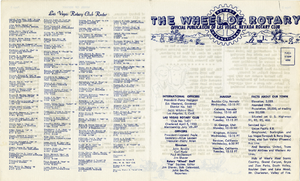Search the Special Collections and Archives Portal
Search Results
Charles A. Hendel Notebook
Identifier
Abstract
The Charles A. Hendel Notebook is comprised of one notebook of poetry and prose written by Charlie Hendel between 1960 and 1976. Topics include the state of Nevada, World War II, American nationalism, and biographical materials about Charles Hendel.
Archival Collection
Frank Scott Papers
Identifier
Abstract
The Frank Scott Papers date from 1940 to 1984 and contain promotional materials, photographs, and menus from the Union Plaza Hotel; University of Nevada, Las Vegas (UNLV) basketball memorabilia; and KRLR TV documentation, correspondence, and news clippings. The collection also contains a scrapbook and photographs of the re-opening of the Mizpah Hotel in Tonopah, Nevada.
Archival Collection
Richard Bryan oral history interviews
Identifier
Abstract
Oral history interviews with Richard Bryan conducted by Kristin Guthre on November 10, 2011 and an unknown date for the Boyer Early Las Vegas Oral History Project. Bryan begins by discussing his father’s time as a law student in Washington, D.C. and the influence his father had on his decision to pursue law. Bryan then chronicles moving to Las Vegas, Nevada in the 1940s and growing up in the Huntridge Community near Charleston Boulevard. Bryan recounts attending both the University of Nevada, Reno and the University of California, Hastings College of the Law in San Francisco, California. Bryan describes his experiences in the Las Vegas District Attorney’s office and the Army Reserve. He then recalls his political career as a member of the Nevada Senate, his role as the Attorney General of Nevada, the Governor of Nevada, and as a United States Senator. Lastly, Bryan discusses political issues in Nevada and the United States during his time in office such as debates about renewable energy, environmentalism, and preservation.
Archival Collection
Flora and Stuart Mason oral history interview
Identifier
Abstract
Oral history interview with Flora and Stuart Mason conducted by David G. Schwartz on February 27, 2010 for the Remembering Jay Sarno Oral History Project. Flora Mason begins by discussing the relationship between her family and the Sarnos. Mason describes that she and her husband socialized with Jay and Joyce Sarno in the 1960s because they lived on the same street in Las Vegas, Nevada. Stuart Mason recounts how the Sarnos were incredibly friendly and Jay occasionally invited him to play golf. Mason then chronicles his role as a contractor and the work he did for Jay Sarno throughout his career. He talks about how many of the development ventures of Sarno's were funded by Jimmy Hoffa and the Teamster’s Union. Lastly, Mason discusses how Sarno understood the gaming industry more than any other casino operator and how that was attributed to the success of Caesars Palace.
Archival Collection

Cristina Alano oral history interview: transcript
Date
Archival Collection
Description
Oral history interview with Cristina Alano conducted by Cecilia Winchell and Stefani Evans on September 9, 2022 for the Reflections: The Las Vegas Asian American and Pacific Islander Oral History Project. In this interview, Alano recalls a happy childhood in Pampanga, Philippines. After attending college for a banking and finance degree, she briefly worked at a bank before marrying her husband and immigrating to the United States. She would go on to move to Colorado where she lived for seven years, and finally moving to Las Vegas, Nevada in 2003. Alano recalls her first jobs in Las Vegas, including Walmart, SEI Electronics, a cashier at the Riviera, and finally the airport where works as a supervisor at Hudson as well as an assistant manager at Brighton. She discusses what she has done at each job and how she ended up getting involved with the Culinary Union in 2016. Since joining the union, she has done everything from being a shop steward to canvassing, most recently flying down to Georgia to help campaign for Senator Warnock. Throughout the rest of the interview, she discusses everything from food, to festivals, and her family.
Text

Transcript of interview with Pauleen Foutz by Don Scott Kaye, February 25, 1980
Date
Archival Collection
Description
Text

Transcript of interview with Bruce Layne by Claytee D. White, June 18, 2004
Date
Archival Collection
Description
Bruce Layne came to Las Vegas in March of 1955 when he was 10 years of age. He attended High school at Bishop Gorman and college at the University of Nevada Las Vegas where he received a B.S. in Economics. In college, he played baseball for three years and was named All Conference Player in 1966. Growing up in Las Vegas, two of his closest long time friends are Governor Bob Miller and Tito Tiberti. Bruce later went on to become the President of Layne & Associates Insurance which was the largest Insurance Agency in Nevada. Bruce tells fabulous stories of his 40-year experience in the Las Vegas community. When he first arrived there were only about 25,000 people living here. Since then, Bruce has been witness to the enormous growth the city has undergone. Throughout the interview, he discusses his book, My Gift, which he wrote after he discovered he had Parkinson's disease in 1999. The book contains valuable advice on life and it has touched the lives of many people who have read it. Today Bruce Layne is relentlessly fighting his battle with Parkinson's disease both for himself and for thousands of others. He continues to have a positive attitude and is supported by his wife, Sherry Layne, and his two sons, Chad and Trevor. VI
Text

Fernando Romero oral history interview: transcript
Date
Archival Collection
Description
Oral history interview with Fernando Romero conducted by Laurents Bañuelos-Benitez on October 2, 2018 for the Latinx Voices of Southern Nevada Oral History Project. Barbara Tabach also participates in the questioning. Fernando Romero was born in El Paso, Texas in a musical home. His father and brother were avid music players, and his brother left El Paso to play in orchestra in Las Vegas. Despite not being as passionate about music as the rest of his family, music was Romero's ticket to higher education. Romero attended University of Nevada South before it was renamed University of Nevada Las Vegas. Romero has gone on to be deeply involved in the Las Vegas community. He is the current president of Hispanics in Politics. Subjects discussed in this interview include: Hispanics in Politics, Nevada Association of Latin Americans, and education.
Text

The Wheel of Rotary Las Vegas Rotary Club newsletter, April 13, 1950
Date
Archival Collection
Description
Text

